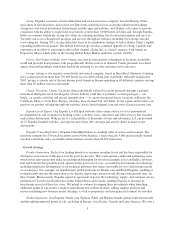Expedia 2013 Annual Report Download - page 21
Download and view the complete annual report
Please find page 21 of the 2013 Expedia annual report below. You can navigate through the pages in the report by either clicking on the pages listed below, or by using the keyword search tool below to find specific information within the annual report.our product selection, impacting our product display and comparability with the airlines own sites or other
channels that show this content detail. In late 2010, American Airlines began to pursue a new distribution
strategy requiring online travel agents to agree to connect directly to American Airlines’ systems, rather than
through GDSs. If other airlines pursue a similar distribution strategy, it could reduce our access to air inventory,
reduce our compensation, result in additional operating expenses related to the development, implementation and
maintenance of the necessary technology systems, increase the frequency or duration of system problems and
delay other projects.
We rely on the value of our brands, and the costs of maintaining and enhancing our brand awareness
are increasing.
We invest considerable financial and human resources in our brands in order to retain and expand our
customer base. We expect that the cost of maintaining and enhancing our brands will continue to increase due to
a variety of factors, including increased spending from our competitors, promotional and discounting activities,
the increasing costs of supporting multiple brands and the impact of competition among our multiple brands,
expansion into geographies and products where our brands are less well known, inflation in media pricing
including search engine keywords and the continued emergence and relative traffic share growth of search
engines and metasearch engines as destination sites for travelers. For example, during 2013, Booking.com,
trivago and TripAdvisor launched offline advertising campaigns in the United States for the first time thus
increasing the number of participants in the travel advertising space, increasing competition for share of voice
and we expect this activity to continue and expand globally in the future. We are also pursuing and expect to
continue to pursue long-term market share growth opportunities in certain markets which have had and may
continue to have a negative impact on our overall marketing efficiency.
Our efforts to preserve and enhance consumer awareness of our brands may not be successful, and, even if
we are successful in our branding efforts, such efforts may not be cost-effective, or as efficient as they have been
historically. Moreover, successful branding efforts with respect to some brands within the Expedia portfolio have
in the past and may in the future result in marketing inefficiencies and negatively impact growth rates of other
brands within our portfolio. If we are unable to maintain or enhance consumer awareness of our brands and
generate demand in a cost-effective manner, it would have a material adverse effect on our business and financial
performance.
We rely on information technology to operate our businesses and maintain our competitiveness, and
any failure to adapt to technological developments or industry trends could harm our business.
We depend on the use of sophisticated information technologies and systems, including technology and
systems used for website and mobile applications, reservations, customer service, communications, procurement,
payments, fraud detection and administration. As our operations grow in size, scope and complexity, we must
continuously improve and upgrade our systems and infrastructure to offer an increasing number of travelers
enhanced products, services, features and functionality, while maintaining or improving the reliability and
integrity of our systems and infrastructure.
Our future success also depends on our ability to adapt our services and infrastructure to meet rapidly
evolving consumer trends and demands while continuing to improve the performance, features and reliability of
our service in response to competitive service and product offerings. The emergence of alternative platforms such
as smartphone and tablet computing devices and the emergence of niche competitors who may be able to
optimize products, services or strategies for such platforms have, and will continue to, require new and costly
investments in technology. We may not be successful, or less successful than our current or new competitors, in
developing technology that operates effectively across multiple technologies and platforms and that is appealing
to consumers, either of which would negatively impact our business and financial performance. New
developments in other areas, such as cloud computing and software as service providers, could also make it
easier for competition to enter our markets due to lower up-front technology costs.
15
























